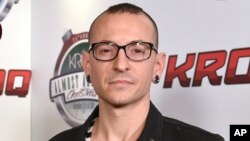The lead singer of rock group Linkin Park, Chester Bennington, was found dead in his California home Thursday. He was 41.
According to news reports, Bennington committed suicide by hanging himself in his home. The Los Angeles County Coroner’s office is investigating.
Bandmate Mike Shinoda confirmed the news via Twitter, saying, “Shocked and heartbroken, but it’s true.” He promised an official statement from the band “as soon as we have one.”
Successful records, MTV darling
Linkin Park’s blend of rap, electronica and heavy metal had wide appeal; nearly all of the band’s records took the top spot on the charts when released. Its style, dubbed “nu-metal,” made it an MTV darling in the early 2000s.
Linkin Park released its debut album, Hybrid Theory, in 2000, and sold 10 million records. The band went on to produce a string of successful records, including this year’s One More Light, released in May.
The band had a show scheduled next week in New York with the group Blink 182.
While playing an essential part in Linkin Park’s sound, Bennington also participated in side projects Dead by Sunrise and Kings of Chaos, groups of high-profile musicians working together on short-term projects. Bennington also served as the lead singer for Stone Temple Pilots from 2013 to 2015 after the departure of vocalist Scott Weiland. In interviews, Bennington said performing with Stone Temple Pilots was the realization of a lifelong dream.
Difficult childhood
Born in Phoenix, Arizona, in 1976, Bennington had a difficult childhood. He was the son of a police officer, and he spoke openly about being the victim of physical and sexual abuse by an older friend. He also suffered bullying in his teen years. He said in interviews that he channeled frustration in his early years into poetry, art and songwriting.
In his teens, he took up drugs and alcohol, developing the addictions that haunted him for much of his life, despite periods of sobriety. He also took up music, but found little success until the late 1990s when he won a spot in the band that would become Linkin Park.
The pains of Bennington’s childhood and young adulthood played into the band’s music, connecting with fans with songs of anger, disappointment, frustration and pain. Their videos were dramatic as well, featuring elaborate sets and scenes of deep emotion, even the one released Thursday morning, Talking to Myself, a song about disconnection and sorrow.
In 2002, Bennington told Rolling Stone magazine, “There’s something inside me that pulls me down.”
Creativity, addiction
While Bennington used creativity to cope with his feelings, he also used drugs and alcohol off and on, he said, starting in his teenage years. He spoke openly about his struggles, telling reporters about his bandmates staging an intervention for him in the early years of Linkin Park’s success. Later, he performed in concerts to benefit anti-addiction causes.
The band’s One More Light, was released just days before the death of Bennington’s close friend Chris Cornell, singer for the band Soundgarden who died of apparent suicide in a Detroit hotel room May 18.
Bennington sang Leonard Cohen’s Hallelujah at Cornell’s funeral in May. His death fell on what would have been Cornell’s 53rd birthday.
Bennington was married twice and had six children.






